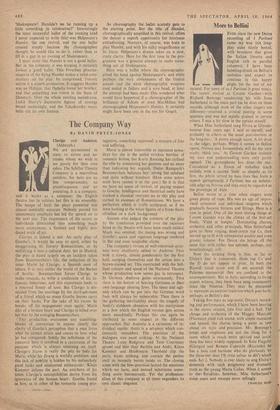More to Bellini
When Miss Sutherland sang Elvira at Glynde- bourne four years ago, I said to myself, and probably to others at the usual post-mortem in thelong-bar: 'A pretty enough score. A bit drab at the edges, perhaps. When it comes to Bellini opera, Norma and Sonnambula will do me very nicely, think you.' At Covent Garden recently my ears and understanding were only partly opened. The gramophone has done the rest. Considered as a fresco of melodies (each melody with a second 'limb' as shapely as its first, the whole served by bass lines that form a superb springboard), I Puritani has an indubit- able edge on Norma and may even be regarded as the prototype of Aida.
Bellini wrote at a time when singers were given plenty of rope. His was an age of impro- vised ornament and individual tangents which gradually became fixtures and fittings. Here is a case in point. One of the most elating things at Covent Garden was the climax of the first-act finale. 'Vieni al tempio.' Dominating chorus, orchestra and other principals, Miss Sutherland gave us three ringing, dead-centre top Cs, then moved up to D with unimpaired quality and even greater volume. For Decca she brings off the same feat with rather less aplomb, perhaps, but breathtakingly still.
Now the striking thing is that, so far as Elvira's line is concerned, these top Cs and the D do not appear in print. In both thp Ricordi vocal score and (I am assured) the Palermo manuscript they are confined to the accompaniment. But in Italy, according to living expert witness, they have been sung consistently since the Nineties. They may be presumed to represent an anterior tradition which goes back, perhaps, to Bellini's day.
Taking five stars as top score, Decca's record- ing and performance, which I have been hearing in the stereo version, rate four and a half. The chows and orchestra of the Maggio Musicale (Florence) yield rich sound, with ample recession and spread, the chorus being a point or two ahead on style and precision. Mr. Bonynge's tempi and emphases are just the thing for a score which is much more spirited and jovial than has been widely supposed. In Ezio Flagella (Giorgio) and Renato Capecchi (Riccardo) he has a bass and baritone who do gloriously by the three-tier duet ('11 rival salvar to dei') which ends Act 2. Nobody is ever likely to sing Elvira's dementia with such poignancy and dramatic truth as the young Maria Callas. When it oomes to the, floridities, however, Miss Sutherland's voice soars and swoops more tellingly.
CHARLES REID






































 Previous page
Previous page